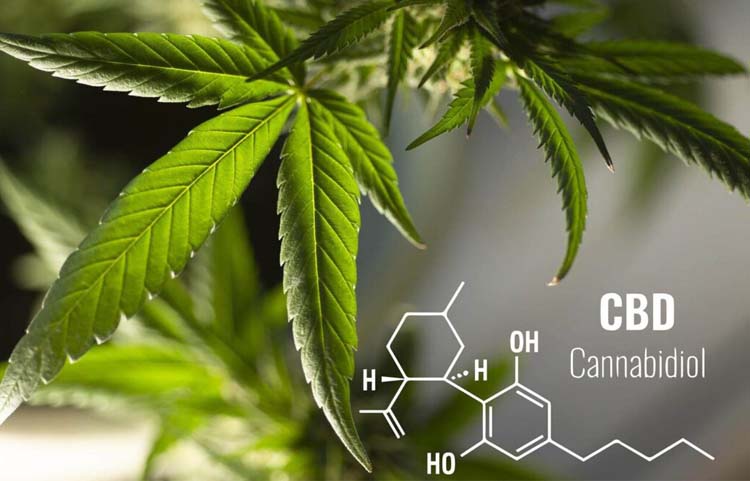Table of Contents [show]
Greater mental health awareness is wonderful, and it’s helped millions of people find solace knowing they’re not alone. Whether it’s anxiety, depression, schizophrenia, bipolar disorder or another condition, people are not solely defined by their mental illness. But many have learned that treatment is very rarely a one-time deal.
Mental Health is Vital
For most, a lifetime of vigilance, self-care and management will be necessary to keep symptoms at bay and thrive despite their struggles. CBD is one way people have begun to cope with anxiety and depression, but is it the right choice for you? This guide is here to answer all the most common questions.
First things first, let’s clear up any confusion about cannabis, CBD, and THC. Cannabis is the plant from which both cannabidiol (CBD) and tetrahydrocannabinol (THC). The former is what has swept through the self-care industry as of late, with people swearing that it eases the symptoms of anxiety and depression, reduces stress, lowers chronic pain and more. The latter is what caused marijuana to be criminalized in the United States for years. THC will make you high, but CBD will not.
Cannabidiol was Federally Legalized
The distinction between the two is important because they possess different legalizations throughout the country. There are still state laws that prohibit cannabis possession, but cannabidiol was federally legalized in 2018. This is why you can purchase it over-the-counter in a variety of locations. However, just because it’s easy to acquire does not mean you should immediately rush forward and start taking whatever you can. As with any substance, CBD can interact with medications or alcohol, and you should only take it after consulting with your doctor about potential risks and complications.
How CBD Works with Mental Health
Cannabidiol is broken down after it is smoked, ingested, or applied to the skin. CBD enzymes then bind to receptors in the brain, resulting in the desired effects people espouse. After it’s been delivered to the brain, CBD reduces the production of neurotransmitters such as serotonin, norepinephrine, glutamate, and gamma-aminobutyric acid (GABA). It also causes blood vessels to dilate, which lowers blood pressure. You will want to be sure you are selecting a quality CBD product before you use it.
For these reasons, you should not take CBD products if you are on any blood pressure medication or take blood thinners. Cannabidiol can also have negative interactions with certain antidepressants, antipsychotics and other prescription medications. If you are taking anything for your mental health or other physical conditions, speaking to a physician is essential before you ever take cannabis in any form.
What Does CBD Do for Mental Health?
After taking cannabidiol, people may experience a variety of effects. Some studies have found that people who took CBD for anxiety and depression reported less severe symptoms, and limited research has found some positive results for using cannabidiol to manage schizophrenia. However, there is still inadequate scientific research to support the widespread adoption of CBD as a legitimate mental health treatment. This means that you should not take it in lieu of therapy, additional self-help and a healthy lifestyle. It may be beneficial to you, but it is by no means a cure-all or substitute for a personalized treatment and prevention plan.
What Types of CBD Are There?
There are three forms of cannabidiol to know about: isolate, full-spectrum and broad-spectrum. Isolate products only contain cannabidiol, though there may be trace amounts of THC in some. Full-spectrum contains additional plant compounds, including varying levels of THC. Broad-spectrum products contain multiple cannabis compounds but no THC. Some people prefer to take cannabis that has both while others only want the effects of cannabidiol. If you’re smoking CBD, then you’ll likely take a different approach than someone who uses edibles, lotion or gummies.
If you decide to smoke cannabis for mental health, then you should speak with your doctor and a mental health professional. While it may be helpful in some ways, marijuana can be harmful. For example, it may actually induce psychosis or trigger the onset of schizophrenia in some people. It can also lead to panic or anxiety attacks.
Excessive use can lead to a dependency that turns into a substance use disorder. Like any other substance, you can become addicted to marijuana. Smoking should be done thoughtfully and responsibly. If you’re incorporating cannabidiol into your mental health care routine, you’ll want to find the right products and dosage for your needs. If you plan on trying multiple strains, you may look into an at-home vaporizer. The Mighty vaporizer by Storz & Bickel is a good option.
What Are the Potential Side-Effects?
Just because cannabidiol is popular doesn’t mean it is safe for everyone, and you should never take it without a medical professional’s approval. Additionally, you should be aware of the potential side effects before you try any products. In some cases, these can also be avoided by sticking to a small dose. Moderation is crucial. Some of the side-effects people experience are:
- Dizziness
- Fatigue
- Loss of appetite
- Nausea and vomiting
- Upset stomach and diarrhea
- Increased anxiety
- Noticeable shifts in mood
CBD and Mental Health – Conclusion
One of the reasons you should take extreme precaution when choosing a product is that there is no regulation in place for labeling. This causes a lot of inconsistencies among packaging, and a product’s ingredient list or description may not always be accurate. To make sure your health is protected, only buy from sellers that are transparent about their cannabis sourcing, manufacturing processes and have extensive reviews online.





